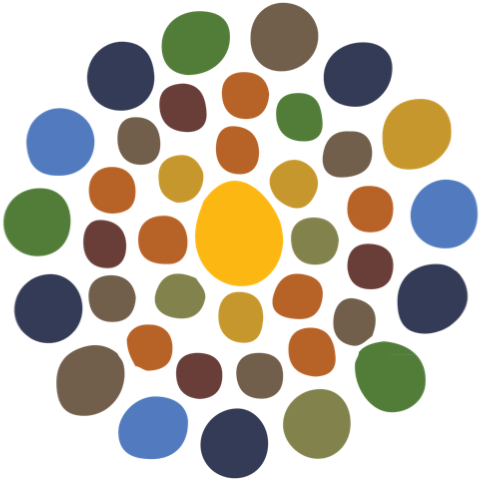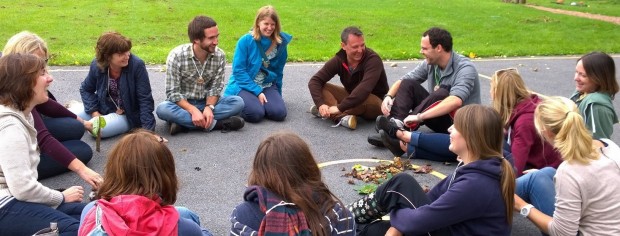Creating music can be fun and help people feel part of something bigger than themselves.
Community. Something shared by all. When we create new music in place, with inspiration from inside ourselves, each other and the environment around us, something special and unique is happening for the very first time. Latest brain research shows that at a very fine subtle level, within the brain chemistry, everyone involved is having the same experience, a shared moment of the present, created as chemicals in their brains. At night, those chemicals are usually stored as new links and pathways. Making music together creates community.
For those of you who don’t know me I am ‘environmental educator”. I have also been a didgeridoo player and percussionist since the early 90’s. In 2009 I wrote a nature connection guidebook called I love my World which has become a best seller in the growing Forest School movement. You can get a free sample here . Over the last few years I have been developing ways of making music, solo and in groups, outdoors. It has come about as a result of ways of teaching didgeridoo players and children in forest school sessions to compose their own music.
The Natural Musicians is a new set of activities and games that uses found natural objects and visible patterns to create, compose and perform music using voice, body percussion and found sounds. The Natural Musicians increases self confidence as the activities ask of a person only what they can offer, there is no right or wrong sound! Every person has value, is valid, and is validified by the music. The activities also help create fellowship, not only with each other, but also with the natural world. It is my belief that this is ultimately for the the greater good for all.
There are a few examples of what we get up to on this simple video:
The Natural Musicians activities can be useful for any group of people that wants to become stronger and more healthy, as individuals, and as a group.
But why, and how is this useful?
“We may not be many but we are ready to be strong as one” Fat Feddy’s Drop (Popular band from NZ)
People who are part of a community have a strength beyond self, and often a greater inner strength and wellbeing. We are all interconnected. “The notion of a separate organism is clearly an abstraction, as is also its boundary. Underlying all this is unbroken wholeness even though our civilization has developed in such a way as to strongly emphasize the separation into parts”. –David Bohm and Basil J. Hile, The Undivided Universe.
Divide and conquer! Advertisers will tell us in 1000 ways that you need another thing or be like someone else to be truly happy. In his book, The Loss of Happiness in Market Democracies, Robert E. Lane argues that as prosperity in a society increases, social solidarity decreases. Happiness not only declines, people become more distrustful of each other as well as their political institutions. Lane argues that we must alter our priorities; we must increase our levels of companionship even at the risk of reducing our income. And that is where music can help increase companionship and wellbeing
Olds and Schwartz (Associate Clinical Professors of Psychiatry at Harvard Medical School) argue in The Lonely American that loneliness is often mistaken for depression. Instead of connecting with others, we consume a pill. Being lonely is outside of our individualistic world view so we don’t even see it as a problem.
Harvard’s Robert Putnam writes about social capital in his book, Bowling Alone, and shows how social ties are not only important for personal well-being, but also for our democracy. To paraphrase Putnam, “the culture in which people talk to each other over the back fence is the culture in which people vote.” Apparently, when you feel part of a group, you’re more likely to contribute to it — such as by voting. Social media is enabling people take to causes so effectively because the community is in the ether, not separated by time or place.
UC Berkeley’s George Lakoff has said that we can only bring about progressive social change by evoking empathy. You can’t get people to change by loading them up with facts or shaking your finger at them. You must talk to others with respect and caring — and then you connect. Social capital is thus central to progressive social change.
Social capital is important for the planet as well. Environmentalist and author Bill McKibben says that we won’t have sustainability without community. Until we see our selves, nature and other people (not the things they sell!), as our main source of security, we’ll keep turning to things, using up oil and other resources and heating and polluting the planet. Until we have community in our neighborhoods, we’ll keep going to the shops in the day and to the TV for our evening’s entertainment.
And why is it beneficial for us to have time in Nature? I could go on, but here is a summary from the National Wildlife Federation in the US, of how nature time effects the bodies, minds and spirits of children:
Body
- Outdoor play increases fitness levels and builds active, healthy bodies, an important strategy in helping the one in three American kids who are obese7get fit.
- Spending time outside raises levels of Vitamin D, helping protect children from future bone problems, heart disease, diabetes and other health issues.8
- Being out there improves distance vision and lowers the chance of nearsightedness.9
Mind
- Exposure to natural settings may be widely effective in reducing ADHD symptoms.10
- Schools with environmental education programs score higher on standardized tests in math, reading, writing and listening.11
- Exposure to environment-based education significantly increases student performance on tests of their critical thinking skills.12
Spirit
- Children’s stress levels fall within minutes of seeing green spaces.13
- Play protects children’s emotional development whereas loss of free time and a hurried lifestyle can contribute to anxiety and depression.14
- Nature makes you “nicer”, enhancing social interactions, value for community and close relationships.15
How can making music in nature can be beneficial to people? For this I turn to two of my favourite teachers, Jon Young, of the wilderness awareness school and the highly talented bass player Victor Wooten: ( Sorry, can’t help it, there are adverts for some webinars and a sale pitch on Jon’s fab book, Coyote’s guide to Nature Connection on there too.)
There are some of the reasons why I think that creating and music in groups, outdoors, with the interconnected source of inspiration being ourselves, each other and the world around us is beneficial for us all.
For years I have been missing having people to play music with on a regular basis, even with the music and didgeridooness I bring to schools. I feel so good after have played music around a fire, been to the local drumming circle or sung at the top of my voice when alone on the sea. My spirit is happy, and I am sure that helps me be more healthy. It is my new years resolution to make more music with more people! Bring it on!
If you want to come on a workshop to come an learn some of the trip n tips of the activities I use….I will be doing some workshops in Feb, in Worcestershire at the Bishops wood centre: click here for more info! http://www.wholeland.org.uk/new-courses-for-feb-2015-at-bishops-wood-worcestershire/
If you want to get a free download sample of my book go here: http://www.wholeland.org.uk/chriss-books/
`For the full report from the NWF on effects of nature time on children here is the link:
.http://www.nwf.org/be-out-there/why-be-out-there/health-benefits.aspx

